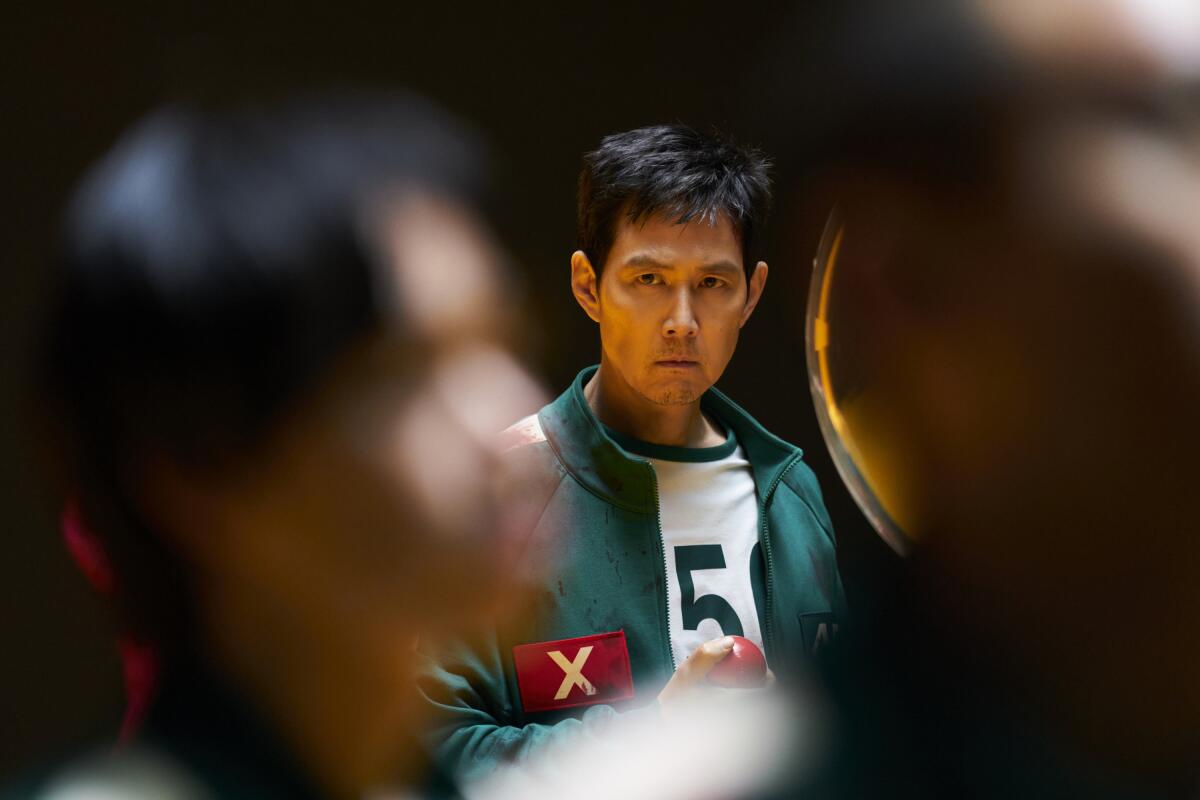‘Squid Game’ finale lays bare a reality: The wealthy win and nice guys finish last

- Share via
Rich people suck.
The message was loud and clear when Netflix‘s Korean thriller “Squid Game” arrived in 2021. Imagining wealth and class disparity at the heart of a high-stakes competition, it featured cash-strapped contestants playing a series of children’s games to the death while uber-wealthy spectators bet on their odds of survival. The show’s masked elites watched the carnage from a luxe, concealed spectator box, chomping on cigars and chortling as player after player met a gruesome death. The Korean-language show became the streamer’s most watched series ever.
Comeuppance for the hideously affluent seemed imminent and likely at the hands of protagonist Seong Gi-hun (Lee Jung-jae). The winner of Season 1’s “Squid Game” deserved vengeance after surviving a series of horrific scenarios — a hopscotch-type match played on a fragile glass bridge above a deadly chasm, a red light-green light contest where players who moved at the wrong time were “eliminated” by machine gun fire. He watched as good people were killed by pink guards, other contestants and their own stupid actions.
But no. The last six “Squid Game” episodes, now streaming on Netflix, did something entirely unsatisfying. They veered from the prospect of timely, eat-the-rich vengeance porn to unflattering commentary about the rest of us, the other 99% who aren’t Elon Musk, Mark Zuckerberg or Jeff Bezos. What did we ever do to deserve a lethal game of double dutch with two giant mechanical children swinging a 10-ton metal rod in place of a jump rope? A lot, apparently.
Creator Hwang Dong-hyuk and star Lee Jung-jae explain the meaning of the final season of their Netflix series and what it says about humans, greed and democracy.
“Squid Game” shows that under the right circumstances, regular folks are just as greedy and morally corrupt as the obscenely prosperous, no matter if their money problems stem from unforeseen medical bills, wanton gambling or generational poverty. Press the little guy or gal hard enough and they’re just as ruthless as the mogul that’s suppressing them.

Season 3 picks up exactly where 2 left off. Gi-hun, who’d found his way back in the clandestine gaming complex (situated inside a mountain on a remote island), is Player 456 again among a new round of contestants. He’d planned to infiltrate the operation from inside, staging a coup against the VIPs and Front Man (Lee Byung-hun) who run the games. But now it’s clear he’s failed. He’s cornered by guards, the players who fought alongside him are dead, and he’s thrown back in with the remaining players, many of whom survived because they’re the most craven of the group.
Free and fair elections are at the heart of every democracy, or so “Squid Game” reminds us each time the bedraggled players are asked for their vote regarding the next round: Continue to compete and thin the herd for a larger reward or stop and split their winnings with their fellow contestants? Majority rules, and each time the group opt to sacrifice their lives — and everyone else’s — in pursuit of money. Series creator Hwang Dong-hyuk has spoken about his dwindling faith in humanity as it relates to his concerns about South Korea’s democracy, and you’ll hear him loud and clear in Season 3: Voting is power, but look what happens when the population increasingly puts its own self-interest above that of the greater good. It’s a scenario that should be recognizable to Americans by now.
“Squid Game” Season 3 takes that idea to the extreme, and quite fearlessly, Hwang puts the series to bed without punishing the rich. Instead he dares to lay bare a truth that’s become all too apparent of late: Wealth wins over morality and money trumps accountability. Nice guys not only finish last, they wind up pulverized like everyone else below a certain tax bracket, no matter their dedication toward humanity.
The Korean show’s run has ended, but not before a finale that alludes to a Hollywood sequel. The episode, set in Los Angeles, shows a familiar scene. A down-and-out man is approached by a mysterious, well-dressed figure who uses a simple kid’s game to test his want of money against his tolerance for pain and humiliation.
Those who’ve watched “Squid Game” will recognize it as the beginning of Gi-hun’s journey, which ended with a sliver of redemption in an abyss of darkness. The mysterious figure appears to be a recruiter for a new, English-language “Squid Game.” She’s played by an A-list celebrity — Cate Blanchett — operating in a city renowned for its self-involvement and privilege. “Squid Game” has a whole new playing field.
More to Read
The complete guide to home viewing
Get Screen Gab for everything about the TV shows and streaming movies everyone’s talking about.
You may occasionally receive promotional content from the Los Angeles Times.








